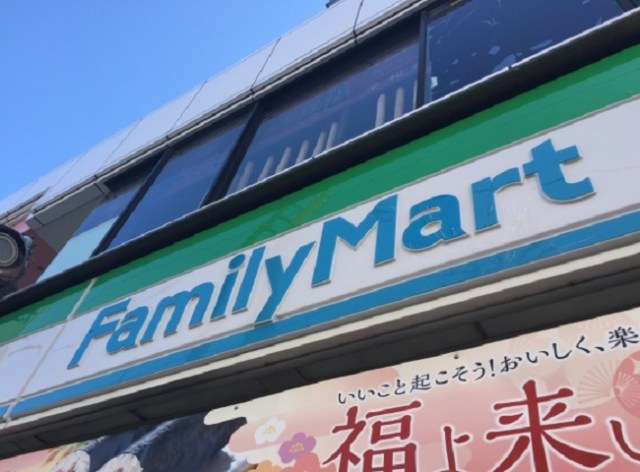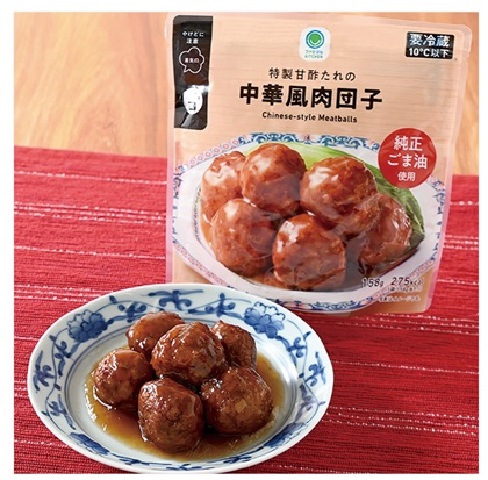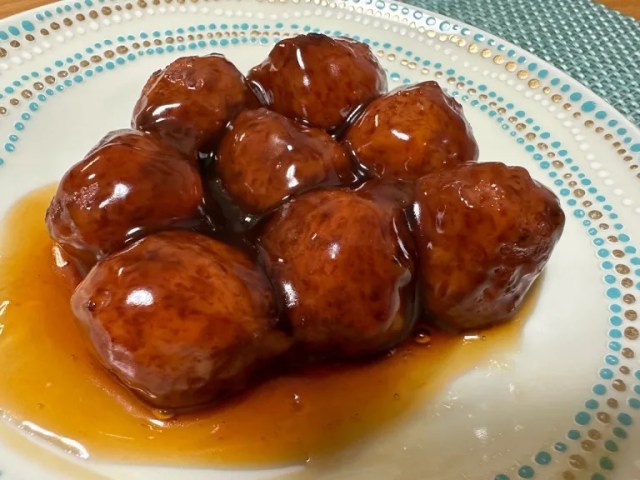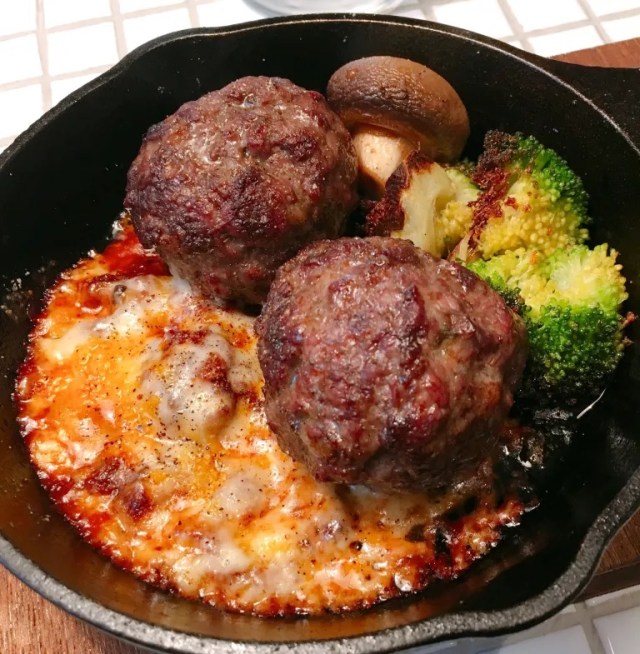
Family Mart wants to make amends for simple yet linguistically complex mistake.
On Monday, Japanese convenience store chain Family Mart issued an apology regarding one of its products. For any company in the food industry, there’s nothing more important than customer trust, and so Family Mart wanted to apologize for a mistake in which packages of meatballs which were sold to customers actually contained Meatballs.
OK, so this food recall notice comes with a side order of linguistics. In Japanese, the word for “meat” is niku. Meanwhile, dango refers to a ball-shaped dumpling or other edible morsel. Put them together, and you get nikudango, which translates as “meatball.” So if you walk into a Family Mart and buy a pack of their Chinese-style nikudango, you wouldn’t be surprised when you open the pack and it contains balls of meat, as shown in the photo below.
So some people were left scratching their heads when Family Mart issued a statement that it’s recalling a number of packs of those nikudango that were sold last weekend because instead of nikudango, they had “Meatballs” inside. See, in addition to nikudango, Family Mart also sells a product officially called, in Japanese, Mito Boru, the Japanese corrupted pronunciation of the English loanword “meatball.”
Family Mart’s statement includes:
“We deeply apologize for the great trouble this has caused our customers, and will be expanding our management efforts and coordination with suppliers to prevent such a thing from happening again.”
While a sincere apology is almost always appreciated in Japan, this situation left more than a few scratching their heads, but there is a legitimate problem Family Mart is addressing. Though nikudango and meatball/mito boru do both technically refer to the same thing, they tend to get used for different purposes within the food industry and foodie circles.
As a Japanese word, nikudango is usually used when talking about meatballs used with traditional Asian seasonings/in Asian cuisine. So, for example, the meatballs that are popular at Chinese restaurants in Japan are generally called nikudango, not “meatballs.” On the other hand, meatballs with/for Western seasonings/dishes usually get called mito boru/meatballs.
▼ The Japanese company that makes these calls them nikudango…
▼ …while the restaurant in Japan that makes these calls them meatballs.
It’s a little like how some restaurants in the U.S. will use the term “wrap” instead of “burrito” if their tortilla-wrapped menu items don’t contain other traditional Mexican foodstuffs; not a hard-and-fast rule or requirement, but more about conveying what sort of flavors/ingredients the customer can expect.
In Family Mart’s case, its nikudango has a sweet-and-sour sauce-style glaze as indicated by the product’s full name, Famimaru Kitchen Special Sweet Vinegar Chinese-style Niku Dango. The Meat Balls, on the other hand, are the Tomato Sauce Meatballs. It’s unclear if the meat mixture is identical between the two products, but at the very least their sauces taste very different from one another. There’s also the matter of price and quantity, with the nikudango pack being 158 grams (5.6 ounces) and 221 yen (US$1.50), and the Meatballs 110 grams for 119 yen, making the nikudango about 30 percent more expensive per gram, which means the customers who received Meatballs by mistake were being overcharged. On the bright side, there seems to be no product safety issue here. Though mislabeled as nikudango, the Meatballs aren’t defective or unsanitary in any way, and Family Mart says there’s no difference in potential allergens contained between its nikudango and Meatballs.
Anyone who purchased the item in question (which has an expiration date of October 2) can bring either the package or the receipt to a Family Mart branch and receive a full refund, which effectively makes this a case of people who’ve already eaten theirs getting a free sample of Family Mart Meatballs, and if you like nikudango enough to be shopping for them, you’d probably enjoy “meatballs” too. In the end, to most people who were affected it’s probably not the “great trouble” Family Mart is worried it might have been, but it’s a good call to correct your mistakes when you can, like when the Pokémon Center apologized for writing model Nicole Fujita’s name as Nicole Fujita.
Source: Family Mart via IT Media
Top image ©SoraNews24
Insert images: Family Mart, SoraNews24
● Want to hear about SoraNews24’s latest articles as soon as they’re published? Follow us on Facebook and Twitter!
Follow Casey on Twitter, where he’s always hungry for linguistics.




 Coming soon to Japan’s Family Mart convenience stores: A whole lot of digital signage
Coming soon to Japan’s Family Mart convenience stores: A whole lot of digital signage Sapporo decides to sell new Japanese beer with English mistake on label
Sapporo decides to sell new Japanese beer with English mistake on label The smallest Family Mart in Japan closes down
The smallest Family Mart in Japan closes down Family Mart and Mos Burger join forces for a special new steamed bun in Japan
Family Mart and Mos Burger join forces for a special new steamed bun in Japan Family Mart recalls “skin-coloured” women’s underwear
Family Mart recalls “skin-coloured” women’s underwear Mikado Coffee is a 76-year-old coffee chain with a major celebrity connection
Mikado Coffee is a 76-year-old coffee chain with a major celebrity connection Do Hi-Chew-flavor Hi-Chews have a reason to exist?【Taste test】
Do Hi-Chew-flavor Hi-Chews have a reason to exist?【Taste test】 Seaside scenery, history, and so many desserts on Yokohama’s Akai Kutsu【Japan Loop Buses】
Seaside scenery, history, and so many desserts on Yokohama’s Akai Kutsu【Japan Loop Buses】 Foreigner’s request for help in Tokyo makes us sad for the state of society
Foreigner’s request for help in Tokyo makes us sad for the state of society French Fries Bread in Tokyo’s Shibuya becomes a hit on social media
French Fries Bread in Tokyo’s Shibuya becomes a hit on social media Japanese city loses residents’ personal data, which was on paper being transported on a windy day
Japanese city loses residents’ personal data, which was on paper being transported on a windy day Sandwiches fit for a sumo served up in Osaka【Taste Test】
Sandwiches fit for a sumo served up in Osaka【Taste Test】 Harajuku Station’s beautiful old wooden building is set to return, with a new complex around it
Harajuku Station’s beautiful old wooden building is set to return, with a new complex around it Japan’s summertime towelket pillowcases are even better with the addition of Ghibli stars【Photos】
Japan’s summertime towelket pillowcases are even better with the addition of Ghibli stars【Photos】 Should you add tartar sauce to Japanese curry rice? CoCo Ichi makes diners an unusual offer
Should you add tartar sauce to Japanese curry rice? CoCo Ichi makes diners an unusual offer McDonald’s new Happy Meals offer up cute and practical Sanrio lifestyle goods
McDonald’s new Happy Meals offer up cute and practical Sanrio lifestyle goods Japanese ramen restaurants under pressure from new yen banknotes
Japanese ramen restaurants under pressure from new yen banknotes Studio Ghibli releases new action figures featuring Nausicaä of the Valley of the Wind characters
Studio Ghibli releases new action figures featuring Nausicaä of the Valley of the Wind characters Red light district sushi restaurant in Tokyo shows us just how wrong we were about it
Red light district sushi restaurant in Tokyo shows us just how wrong we were about it New private rooms on Tokaido Shinkansen change the way we travel from Tokyo to Kyoto
New private rooms on Tokaido Shinkansen change the way we travel from Tokyo to Kyoto Tokyo Tsukiji fish market site to be redeveloped with 50,000-seat stadium, hotel, shopping center
Tokyo Tsukiji fish market site to be redeveloped with 50,000-seat stadium, hotel, shopping center Beautiful Ghibli sealing wax kits let you create accessories and elegant letter decorations【Pics】
Beautiful Ghibli sealing wax kits let you create accessories and elegant letter decorations【Pics】 Studio Ghibli releases Kiki’s Delivery Service chocolate cake pouches in Japan
Studio Ghibli releases Kiki’s Delivery Service chocolate cake pouches in Japan New definition of “Japanese whiskey” goes into effect to prevent fakes from fooling overseas buyers
New definition of “Japanese whiskey” goes into effect to prevent fakes from fooling overseas buyers Our Japanese reporter visits Costco in the U.S., finds super American and very Japanese things
Our Japanese reporter visits Costco in the U.S., finds super American and very Japanese things All-you-can-drink Starbucks and amazing views part of Tokyo’s new 170 meter-high sky lounge
All-you-can-drink Starbucks and amazing views part of Tokyo’s new 170 meter-high sky lounge More foreign tourists than ever before in history visited Japan last month
More foreign tourists than ever before in history visited Japan last month New Pokémon cakes let you eat your way through Pikachu and all the Eevee evolutions
New Pokémon cakes let you eat your way through Pikachu and all the Eevee evolutions Disney princesses get official manga makeovers for Manga Princess Cafe opening in Tokyo
Disney princesses get official manga makeovers for Manga Princess Cafe opening in Tokyo Sales of Japan’s most convenient train ticket/shopping payment cards suspended indefinitely
Sales of Japan’s most convenient train ticket/shopping payment cards suspended indefinitely Sold-out Studio Ghibli desktop humidifiers are back so Totoro can help you through the dry season
Sold-out Studio Ghibli desktop humidifiers are back so Totoro can help you through the dry season Japanese government to make first change to romanization spelling rules since the 1950s
Japanese government to make first change to romanization spelling rules since the 1950s Ghibli founders Toshio Suzuki and Hayao Miyazaki contribute to Japanese whisky Totoro label design
Ghibli founders Toshio Suzuki and Hayao Miyazaki contribute to Japanese whisky Totoro label design Doraemon found buried at sea as scene from 1993 anime becomes real life【Photos】
Doraemon found buried at sea as scene from 1993 anime becomes real life【Photos】 Tokyo’s most famous Starbucks is closed
Tokyo’s most famous Starbucks is closed One Piece characters’ nationalities revealed, but fans have mixed opinions
One Piece characters’ nationalities revealed, but fans have mixed opinions We asked a Uniqlo employee what four things we should buy and their suggestions didn’t disappoint
We asked a Uniqlo employee what four things we should buy and their suggestions didn’t disappoint Princesses, fruits, and blacksmiths: Study reveals the 30 most unusual family names in Japan
Princesses, fruits, and blacksmiths: Study reveals the 30 most unusual family names in Japan Japanese convenience store chain running out of fried chicken, takes precautions to save Christmas
Japanese convenience store chain running out of fried chicken, takes precautions to save Christmas Family Mart convenience stores will stop offering plastic forks, recommends chopsticks instead
Family Mart convenience stores will stop offering plastic forks, recommends chopsticks instead Japanese convenience store fools us with its 40-percent-more sandwich, but in a good way
Japanese convenience store fools us with its 40-percent-more sandwich, but in a good way Pokémon Center apologizes for writing model Nicole Fujita’s name as Nicole Fujita
Pokémon Center apologizes for writing model Nicole Fujita’s name as Nicole Fujita Japan super budget dining – What’s the best way to spend 1,000 yen at Family Mart?
Japan super budget dining – What’s the best way to spend 1,000 yen at Family Mart? Which Japanese convenience store sells the best beef stew?【Taste test】
Which Japanese convenience store sells the best beef stew?【Taste test】 We visit the limited-time IKEA café in Tokyo
We visit the limited-time IKEA café in Tokyo Japan’s Family Mart convenience store chain adding fitness clubs to select locations
Japan’s Family Mart convenience store chain adding fitness clubs to select locations Tokyo convenience store has full bar inside with Japanese whiskey, will smoke your combini snacks
Tokyo convenience store has full bar inside with Japanese whiskey, will smoke your combini snacks Remote-control VR robots to start working in Japanese convenience stores this summer
Remote-control VR robots to start working in Japanese convenience stores this summer Which Japanese convenience store sells the best pizzas?【Taste test】
Which Japanese convenience store sells the best pizzas?【Taste test】 Japan’s Family Mart selling rainbow socks, rainbow-package fried chicken as show of LGBTQ support
Japan’s Family Mart selling rainbow socks, rainbow-package fried chicken as show of LGBTQ support Japanese convenience store denies use of Nintendo alien labor in new dessert sandwich
Japanese convenience store denies use of Nintendo alien labor in new dessert sandwich This beautiful, traditional Japanese building is actually a fully modern convenience store
This beautiful, traditional Japanese building is actually a fully modern convenience store Japan’s Family Mart celebrates International Women’s Day with year-long sanitary goods discount
Japan’s Family Mart celebrates International Women’s Day with year-long sanitary goods discount
Leave a Reply